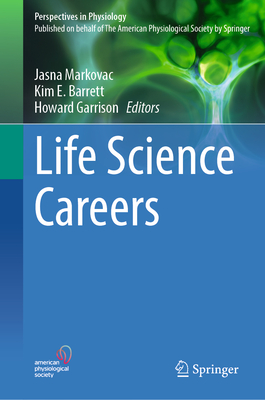Life Science Careers

Life Science Careers
Dr. Kim E. Barrett is originally from the United Kingdom, and earned both her B.Sc. (Medicinal Chemistry) and her Ph.D. (Biological Chemistry) from University College London, England as the first in her family to pursue post-secondary education. She continued her training with a postdoc at the U.S. National Institute for Allergy and Infectious Diseases and then held a faculty position at the University of California San Diego, where she rose to the rank of Distinguished Professor of Medicine and also served as Dean of the Graduate Division. She is currently Vice Dean for Research and Distinguished Professor of Physiology and Membrane Biology in the School of Medicine at the University of California, Davis. Barrett is an internationally recognized scholar in gastrointestinal physiology, and she has received numerous honors and awards for her research, teaching, mentoring, and service activities, including the Bodil Schmidt-Nielsen Distinguished Scientist and Mentor Award from APS and the Distinguished Achievement Award in Basic Science from the American Gastroenterological Association. Her perspective on bioscience careers was broadened by her service as APS President and as the rotating Director of the Division of Graduate Education at the National Science Foundation.
Dr. Howard Garrison earned his doctorate in Sociology at the University of Wisconsin, Madison. After that, he conducted research on employment and training issues while a faculty member at Virginia Commonwealth University and an analyst at the U.S. Commission on Civil Rights. An opportunity to work at the Institute of Medicine (now the National Academy of Medicine) on a study of national needs for biomedical and behavioral science research led to a career-long interest in the biological sciences. His research on the biological sciences brought him to FASEB where, for 25 years, he established the Office of Policy Analysis and Research and directed the Office of Public Affairs while continuing to conduct research on scientific employment and training. During his tenure at FASEB, the number of member societies grew from eight to 31, the NIH budget doubled, and the Federation became recognized as the principal organization representing biomedical researchers. He is the recipient of public service awards from FASEB and the American Association of Immunologists.
PRP: 278.94 Lei
Acesta este Prețul Recomandat de Producător. Prețul de vânzare al produsului este afișat mai jos.
251.05Lei
251.05Lei
278.94 LeiLivrare in 2-4 saptamani
Descrierea produsului
Dr. Kim E. Barrett is originally from the United Kingdom, and earned both her B.Sc. (Medicinal Chemistry) and her Ph.D. (Biological Chemistry) from University College London, England as the first in her family to pursue post-secondary education. She continued her training with a postdoc at the U.S. National Institute for Allergy and Infectious Diseases and then held a faculty position at the University of California San Diego, where she rose to the rank of Distinguished Professor of Medicine and also served as Dean of the Graduate Division. She is currently Vice Dean for Research and Distinguished Professor of Physiology and Membrane Biology in the School of Medicine at the University of California, Davis. Barrett is an internationally recognized scholar in gastrointestinal physiology, and she has received numerous honors and awards for her research, teaching, mentoring, and service activities, including the Bodil Schmidt-Nielsen Distinguished Scientist and Mentor Award from APS and the Distinguished Achievement Award in Basic Science from the American Gastroenterological Association. Her perspective on bioscience careers was broadened by her service as APS President and as the rotating Director of the Division of Graduate Education at the National Science Foundation.
Dr. Howard Garrison earned his doctorate in Sociology at the University of Wisconsin, Madison. After that, he conducted research on employment and training issues while a faculty member at Virginia Commonwealth University and an analyst at the U.S. Commission on Civil Rights. An opportunity to work at the Institute of Medicine (now the National Academy of Medicine) on a study of national needs for biomedical and behavioral science research led to a career-long interest in the biological sciences. His research on the biological sciences brought him to FASEB where, for 25 years, he established the Office of Policy Analysis and Research and directed the Office of Public Affairs while continuing to conduct research on scientific employment and training. During his tenure at FASEB, the number of member societies grew from eight to 31, the NIH budget doubled, and the Federation became recognized as the principal organization representing biomedical researchers. He is the recipient of public service awards from FASEB and the American Association of Immunologists.
Detaliile produsului










